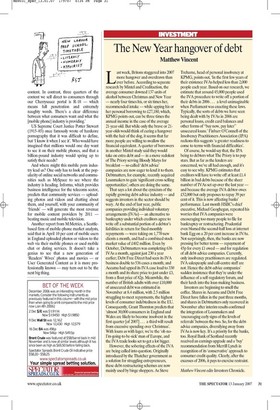The New Year hangover of debt
Matthew Vincent Last week, Britons staggered into 2007 more hungover and overdrawn than ever before. According to separate research by Mintel and Creditaction, the average consumer downed 137 units of alcohol between Christmas and New Year — nearly four times his, or six times her, recommended intake — while upping his or her personal borrowing to £27,180, which, KPMG points out, can be three times the annual income in the case of the average 21-year-old. But while only the brave or 21year-olds would think of curing a hangover with the hair of the dog, it seems that far more people are willing to swallow the financial equivalent. A quarter of borrowers in another Mintel study said they would take on extra debt and — in a move redolent of The Priory serving Bloody Malys for breakfast — so-called 'debt advice' companies are now eager to lend it to them. Debtmatters, for example, recently acquired Loanmakers to gain 'significant cross-selling opportunities'; others are doing the same.
That says a lot about the cynicism of the rapidly growing debt-advice industry — and suggests investors in the sector should be wary. At the end of last year, public companies providing individual voluntary arrangements (IVAs) — an alternative to bankruptcy under which creditors agree to write off a substantial portion of a debtor's liabilities in return for fixed monthly repayments —were taking on 1,770 new clients a month, and had a combined stockmarket value of £402 million Even by October, Debtmatters was completing 636 IVAs a month, against just 230 a year earlier; Debt Free Direct had seen its IVA business double to 536 cases a month; and Accuma had upped its IVA case load to 330 a month and its share price to just under £3, from a float price of 82p. Meanwhile, the number of British adults with over £10,000 of unsecured debt was estimated in November at 8.4 million, with 2.5 million struggling to meet repayments, the highest levels of consumer indebtedness in the EU. Consequently, Grant Thornton predicts that 'almost 30,000 consumers in England and Wales are likely to become insolvent in the first quarter [of 20071 ... a third will result from excessive spending over Christmas'. With loans as with lager, we're the `oh-noI'm-going-to-be-sick' man of Europe, and the IVA trade looks set to get a lot bigger.
However, the sobering effects of the IVA are being called into question. Originally introduced by the Thatcher government as a solution for struggling entrepreneurs, these debt-restructuring schemes are now mainly used by binge shoppers. As Steve Treharne, head of personal insolvency at KPMG, points out, 'In the first few years of their existence IVAs helped less than 2,000 people each year. Based on our research, we estimate that around 45,000 people used the IVA procedure to write off a portion of their debts in 2006... a level unimaginable when Parliament was enacting these laws. Typically, the sorts of debts we have seen being dealt with by IVAs in 2006 are personal loans, credit card balances and other forms of "buy now, pay later" unsecured loans.' Finbarr O'Connell of the Insolvency Practitioners Association (IPA) reckons this suggests 'a greater readiness to come to terms with financial difficulties'.
Of course, he would say that, the IPA being to debtors what The Priory is to pop stars. But as far as the lenders are concerned, we've all had enough, and it's easy to see why. KPMG estimates that creditors will have to write off at least £1.4 billion in bad debts because of the sheer number of IVAs set up over the last year — and because the average IVA debtor owes £52,000 but only proposes to repay 39 per cent of it. This is now affecting banks' performance. Last month HSBC's chief executive, Michael Geoghegan, repeated his worries that IVA companies were encouraging too many people to file for bankruptcy or restructuring. Prudential even blamed the second-half loss at internet bank Egg on a 20 per cent increase in IVAs. Not surprisingly, then, the banks are now pressing for better terms — repayment of 45p for every £1 owed — and for regulation of all debt-advice companies. Currently, only insolvency practitioners are regulated. IVA salespeople and call-centre staff are not. Hence the debt-advice companies' sudden insistence that they're under the influence of a self-regulatory forum, and their lurch into the loan-making business.
Investors are beginning to smell the coffee. Shares in Accuma and Debt Free Direct have fallen in the past three months, and shares in Debtmatters only recovered in November after interim results confirmed the integration of Loanmakers and 'encouraging early signs of the levels of referrals' between the two. So, for the debtadvice companies, diversifying away from IVAs is now key. It's a priority for the banks, too. Royal Bank of Scotland recently received an earnings upgrade and a 'buy' recommendation from Merrill Lynch in recognition of its 'conservative' approach to consumer credit quality. Clearly, after the excesses of 2006, it pays to exercise restraint.






















































 Previous page
Previous page